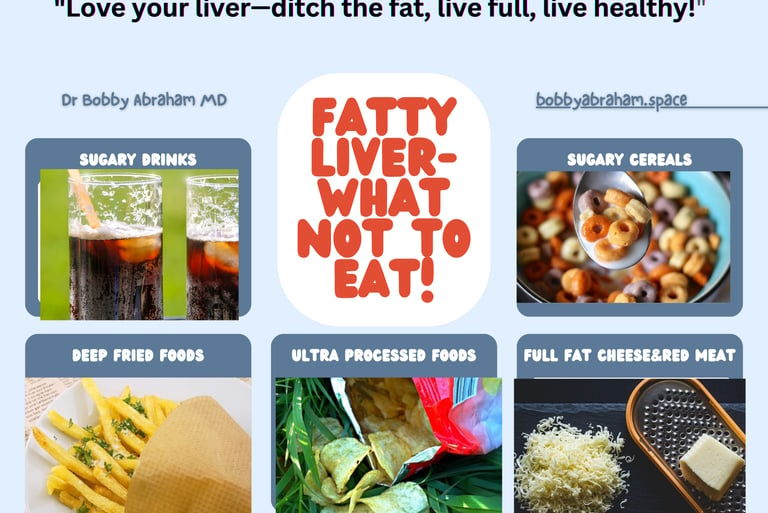Fatty Liver and Weight Loss: How Shedding Pounds Can Save Your Liver
Learn how weight loss can reverse fatty liver disease. Discover the link between obesity and liver health, and get practical tips on diet, exercise, and sustainable habits to protect and heal your liver naturally.


🩺 What Is Fatty Liver and Why Should You Care?
When i sit in my busy out patient clinics wherein i see ultrasound reports of patients, one of the commonest reported finding is fatty liver disease of varying grades.Fatty liver disease, medically known as hepatic steatosis, is a condition where excess fat builds up in the liver. It’s becoming one of the most common liver problems worldwide, especially with the rise in obesity, sedentary lifestyles, and poor diets.
While the term "fatty liver" may sound harmless, it's far from it. If left unchecked, it can progress to non-alcoholic steatohepatitis (NASH), liver fibrosis, cirrhosis, and rarely even liver cancer.
The good news? For most people, fatty liver is reversible especially in the early stages—and losing weight is the most effective treatment.
To read about the basics on fatty liver click here.
⚖️ Obesity and Fatty Liver: A Dangerous Connection
There’s a strong and direct link between obesity and fatty liver disease. In fact:
Nearly 70–90% of people who are obese have some degree of fatty liver.
Central obesity (belly fat) is particularly harmful because it increases insulin resistance and promotes fat storage in the liver.
Even lean individuals can develop fatty liver if they have visceral fat (fat around internal organs) or metabolic syndrome.
This liver fat isn’t just “stored energy”—it actively causes inflammation, oxidative stress, and scarring in liver tissue. That’s why addressing the root cause—excess weight—is key to reversing this condition.
🧪 How Weight Loss Helps Reverse Fatty Liver
Losing weight doesn't just improve how you look or feel—it can literally save your liver. Here's how:
✅ Reduces liver fat: Just 5–10% weight loss can lead to a 20–30% reduction in liver fat.
✅ Improves insulin sensitivity: Lower weight = better glucose control = less fat storage
✅ Reverses inflammation: Less fat means fewer inflammatory signals damaging the liver
✅ Lowers ALT/AST levels: These are liver enzymes that improve as the liver heals
✅ Decreases fibrosis risk: Sustained weight loss reduces the chance of liver scarring
In some studies, losing as little as 3–5% of your body weight significantly improves liver function. With 7–10% or more weight loss, there’s potential for almost complete reversal of fatty liver disease.
🥗 How to Lose Weight for Liver Health – The Right Way
As a physician, I often remind patients: crash diets don’t work—and they may even worsen fatty liver by triggering rapid fat breakdown and increasing stress on the liver.
Here’s what science recommends:
1. Focus on Nutrition, Not Just Calories
Prioritize whole foods: vegetables, fruits, whole grains, lean protein, nuts, and seeds
Reduce refined carbs and sugars, especially sugary drinks and packaged snacks
Increase fiber intake to improve metabolism and gut health
Choose healthy fats (like olive oil, avocados, and fatty fish)
✅ A Mediterranean-style diet has shown excellent results in managing fatty liver.
2. Move More, Sit Less
Aim for at least 150–300 minutes of moderate aerobic activity weekly
Include resistance training 2–3 times per week to boost muscle mass and metabolism
Even light daily activity (walking, stretching, house chores) helps burn fat and lower insulin resistance
Tip: Fatty liver responds especially well to regular, moderate exercise, even without drastic weight loss.
3. Lose Weight Gradually
Aim for a weight loss of 0.5–1 kg (1–2 pounds) per week
Sudden, extreme diets may lead to muscle loss and worsened liver inflammation
4. Watch Alcohol and Medications
Even if your condition is labeled “non-alcoholic,” alcohol can accelerate liver damage
Always discuss medications, supplements, and herbs with your doctor to avoid liver toxicity
🔍 Signs Your Liver May Be Suffering
Most people with fatty liver don’t have symptoms early on. But these may appear as the condition progresses:
Fatigue
Discomfort or dull pain in the upper right abdomen
Elevated liver enzymes in blood tests
Unexplained weight gain or bloating
That’s why regular checkups, blood tests (like ALT, AST), and imaging (ultrasound or FibroScan) are essential—especially if you’re overweight or have type 2 diabetes.
🧠 Fat Loss vs. Weight Loss: Why It Matters
Not all weight loss is equal. The goal isn’t just to lose weight—it’s to loose visceral and liver fat, while maintaining or building lean muscle. That’s what truly restores metabolic and liver health.
So instead of obsessing over the scale, focus on:
Waist circumference (ideal: <90 cm for men, <80 cm for women)
Body composition (muscle vs. fat ratio)
Liver enzyme levels
How you feel and function daily
✅ Final Takeaway: Your Liver Deserves a Fresh Start
Fatty liver is silent but serious—and weight loss is the most effective prescription we have to fight it. The changes may seem small, but even modest improvements in your weight and habits can dramatically improve your liver function.
Start with simple steps: swap soda for water, walk after dinner, eat more veggies, sleep well. Consistency over perfection.
Your liver is one of the most resilient organs in your body. Give it a chance, and it will heal






